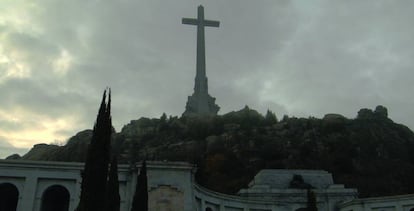Government denies Valley of the Fallen is a Francoist monument
Popular Party administration argues it has removed all of the dictatorship-era symbols under its remit
In an ongoing dispute about the status of the huge Valley of the Fallen monument outside Madrid, the Spanish government on Wednesday denied the site honored the legacy of former Spanish dictator Francisco Franco.

The 13.6-square kilometer site – which features a basilica and, most notably, a 150-meter-high cross on a granite outcrop – was ostensibly built to commemorate those killed in Spain’s bitter and bloody 1936-1939 Civil War. The remains of more than 33,000 victims of the conflict are buried there.
But the Valley of the Fallen, which is also a popular tourist attraction, contains just two marked graves: those of Franco and José Antonio Primo de Rivera, the founder of the Falange, Spain’s fascist-inspired political party. At the same time, thousands of prisoners of war who fought against Franco in the civil conflict were among the workforce used in its construction.
The Valley of the Fallen contains just two marked graves: those of Franco and José Antonio Primo de Rivera
As such, the site – like the legacy of Franco in Spain as a whole – remains an object of political controversy.
On Wednesday, the conservative Popular Party government of Mariano Rajoy said it had fulfilled all of its legal requirements when it came to removing Francoist imagery, in line with Spain’s Historical Memory Law, which makes provision for the removal of statues and the changing of place names connected to the regime.
In a parliamentary response, the government argued that the Valley of the Fallen is not a Francoist monument, and that it is strictly governed by the rules applicable to places of worship and public cemeteries, noting it had done all it could within its federal powers and that it could only make “recommendations” when it came to issues under regional or local jurisdiction.
“In no part of the [Valley of the Fallen] site can either political acts or [acts] honoring the Civil War, its participants or Francoism be carried out,” the statement read.
The senator described the government’s answer as insulting and “absurd”
Wednesday’s statement came in response to a written query from Carles Mulet, a senator with Spain’s left-leaning Compromís party who had called on the government to clarify whether it planned to remove Franco-era references from the Valley of the Fallen.
In the statement, the government said the foundation charged with managing the Valley of the Fallen site aimed to “honor and rehabilitate the memory of everyone who had died during the Civil War and the political repression [that followed].”
It was clear that the site did not have the significance suggested by Mulet, the government argued.
But Mulet described the government’s answer as insulting and said its claim that the Valley of the Fallen was not a Francoist mausoleum was “absurd.”
“Anyone can see that that foundation [managing the site] haven’t complied with these aims; while Francisco Franco and Primo de Rivera have pride of place in the basilica, thousands of bodies of the victims of reprisals are piled up without even a mention or a minimal level of recognition,” said the Compromís senator.
English version by George Mills.
Tu suscripción se está usando en otro dispositivo
¿Quieres añadir otro usuario a tu suscripción?
Si continúas leyendo en este dispositivo, no se podrá leer en el otro.
FlechaTu suscripción se está usando en otro dispositivo y solo puedes acceder a EL PAÍS desde un dispositivo a la vez.
Si quieres compartir tu cuenta, cambia tu suscripción a la modalidad Premium, así podrás añadir otro usuario. Cada uno accederá con su propia cuenta de email, lo que os permitirá personalizar vuestra experiencia en EL PAÍS.
¿Tienes una suscripción de empresa? Accede aquí para contratar más cuentas.
En el caso de no saber quién está usando tu cuenta, te recomendamos cambiar tu contraseña aquí.
Si decides continuar compartiendo tu cuenta, este mensaje se mostrará en tu dispositivo y en el de la otra persona que está usando tu cuenta de forma indefinida, afectando a tu experiencia de lectura. Puedes consultar aquí los términos y condiciones de la suscripción digital.








































